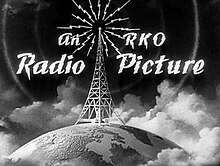
Back آر كي أو بيكتشرز Arabic ار كى او پيكتشارز ARZ RKO Pictures AST RKO Pictures Azerbaijani آر.ک.ئو AZB RKO Radio Pictures BE-X-OLD আরকেও পিকচার্স Bengali/Bangla RKO Pictures Catalan ئاڕ کەی ئۆ پیکچەرز CKB RKO Pictures Czech
 | |
| Company type | Subsidiary |
|---|---|
| Industry | Motion pictures |
| Predecessors | |
| Founded | January 25, 1929 (as RKO Productions Inc.) |
| Founder | David Sarnoff |
| Defunct | 1959 |
| Fate | Dissolved |
| Headquarters | 1270 Avenue of the Americas, New York City, New York |
| Parent |
|
RKO Radio Pictures Inc., commonly known as RKO Pictures or simply RKO, was an American film production and distribution company, one of the "Big Five" film studios of Hollywood's Golden Age. The business was formed after the Keith-Albee-Orpheum theater chain and Joseph P. Kennedy's Film Booking Offices of America studio were brought together under the control of the Radio Corporation of America (RCA) in October 1928. RCA executive David Sarnoff engineered the merger to create a market for the company's sound-on-film technology, RCA Photophone, and in early 1929 production began under the RKO name (an initialism of Radio-Keith-Orpheum). Two years later, another Kennedy concern, the Pathé studio, was folded into the operation. By the mid-1940s, RKO was controlled by investor Floyd Odlum.
RKO has long been renowned for its cycle of musicals starring Fred Astaire and Ginger Rogers in the mid- to late 1930s. Actors Katharine Hepburn and, later, Robert Mitchum had their first major successes at the studio. Cary Grant was a mainstay for years, with credits including touchstones of the screwball comedy genre with which RKO was identified. The work of producer Val Lewton's low-budget horror unit and RKO's many ventures into the field now known as film noir have been acclaimed, largely after the fact, by film critics and historians. The studio produced two of the most famous films in motion picture history: King Kong and producer/director/star Orson Welles's Citizen Kane. RKO was also responsible for notable coproductions such as It's a Wonderful Life and Notorious, and it distributed many celebrated films by animation pioneer Walt Disney and leading independent producer Samuel Goldwyn. Though it often could not compete financially for top star and director contracts, RKO's below-the-line personnel were among the finest, including composer Max Steiner, cinematographer Nicholas Musuraca, and designer Van Nest Polglase.
Maverick industrialist Howard Hughes took over RKO in 1948. After years of disarray and decline under his control, the studio was acquired by the General Tire and Rubber Company in 1955. It soon broke new business ground as the first major studio to sell the bulk of its film library's TV rights. The original RKO Pictures ceased production in 1957 and was effectively dissolved two years later. In 1978, broadcaster RKO General, the corporate heir, launched a production subsidiary, RKO Pictures Inc., which revived the theatrical brand with its first releases three years later. In 1989, this business, with its remaining assets, including the studio trademarks and the remake rights to many classic RKO films, was sold to new owners, who established the small independent company RKO Pictures LLC. The original studio's film library is now largely controlled by Warner Bros. Discovery.